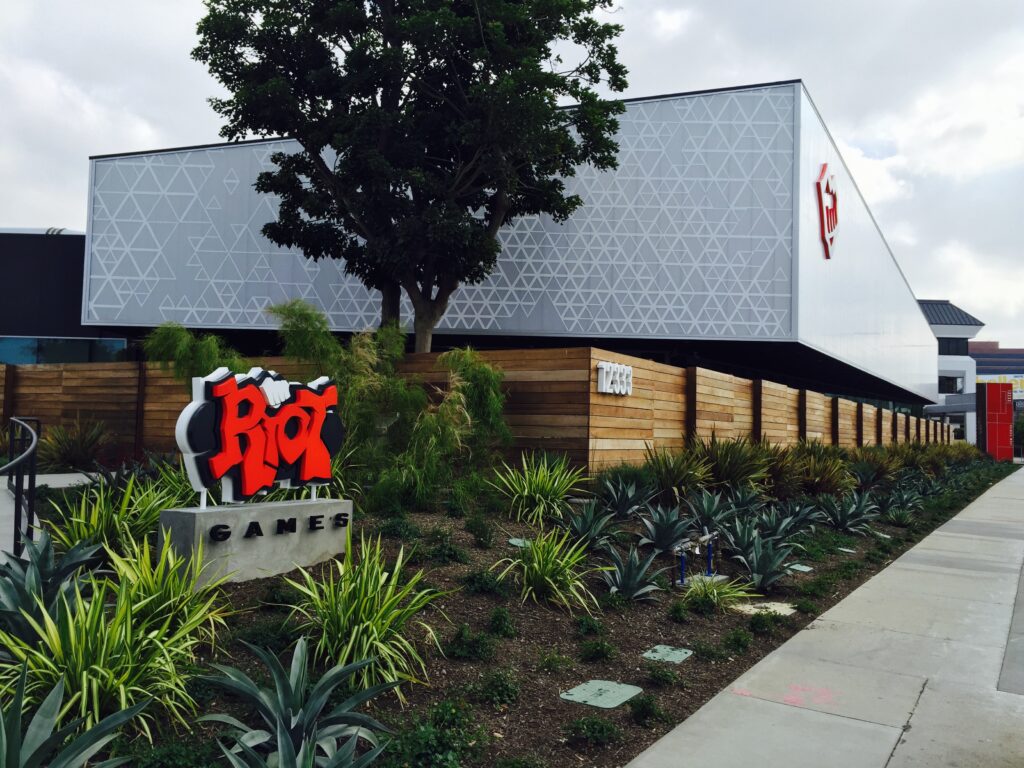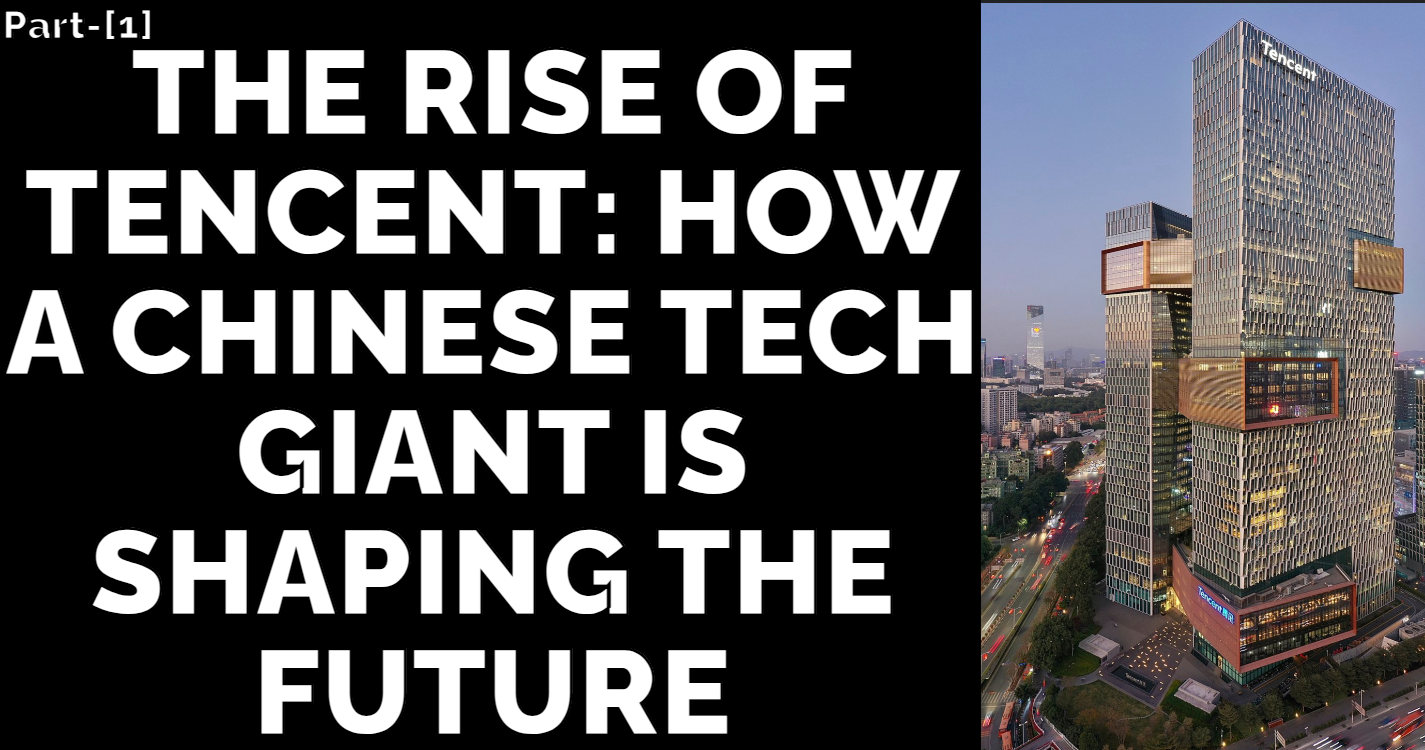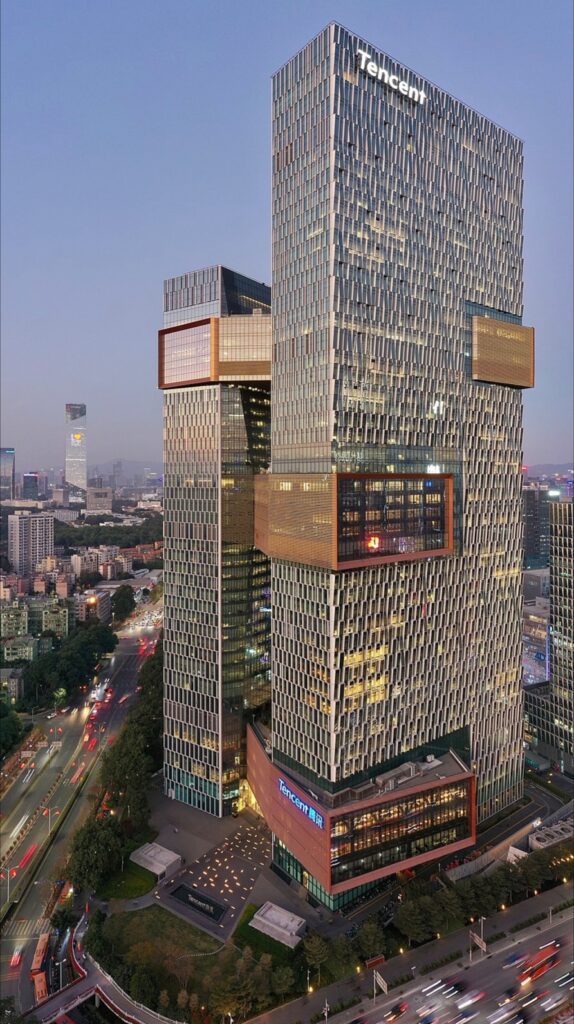Part-[1]
Tencent Holdings Ltd. (Chinese: 腾讯; pinyin: Téngxùn) is a prominent Chinese multinational technology conglomerate based in Shenzhen. Renowned for its impressive revenue, Tencent ranks among the highest-grossing multimedia companies globally and holds the title of the world’s largest video game company by equity investment.
Established in 1998, Tencent’s subsidiaries offer various Internet-related services and products worldwide, including entertainment, artificial intelligence, and other advanced technologies. The company’s twin-skyscraper headquarters, Tencent Seafront Towers (also known as Tencent Binhai Mansion), are situated in Shenzhen’s Nanshan District. In December 2023, architect Büro Ole Scheeren unveiled a helix-inspired design for Tencent’s new global headquarters in Shenzhen, known as Tencent Helix, which will house over 23,000 employees across nearly 500,000 square meters.
Tencent stands as the leading video game vendor globally and is one of the largest companies by market capitalization. It also ranks among the top social media, venture capital, and investment firms. The company’s diverse range of services includes social networks, music, web portals, e-commerce, mobile games, internet services, payment systems, smartphones, and multiplayer online games. Tencent operates popular instant messaging services such as Tencent QQ and WeChat, in addition to the news platform QQ.com. In 2018, Tencent’s market value surpassed US$500 billion, making it the first Asian technology company to reach this milestone. It has since become the most valuable publicly traded company in China and the world’s tenth most valuable company by market value as of February 2022. The Boston Consulting Group and Fast Company recognized Tencent as one of the 50 most innovative companies worldwide in 2015, 2018, and 2020.
With stakes in over 600 companies, Tencent shifted its focus to tech startups in Asia starting in 2017. TechCrunch described Tencent’s investment approach as allowing its portfolio startups to operate independently. Tencent’s valuation neared US$1 trillion in January 2021 before experiencing a decline. In 2023, Tencent Holdings was ranked 35th on Forbes’ Global 2000 list.
History
1998–2010: Founding and Growth
Tencent was established in November 1998 by Pony Ma, Zhang Zhidong, Xu Chenye, Charles Chen, and Zeng Liqing under the name Tencent Inc. in the Cayman Islands. The name “Tencent” is derived from its Chinese name, Tengxun (腾讯), which includes part of Pony Ma’s Chinese name (Ma Huateng; 马化「腾」) and translates to “galloping fast information.” The company initially received funding from venture capitalists.
In February 1999, Tencent launched its messenger product OICQ. Soon after, the name was changed to QQ, reportedly due to a lawsuit threat from ICQ and its owner, AOL. The company remained unprofitable during its first three years.
In 2001, South African media company Naspers acquired a 46.5% share of Tencent. As of 2023, Naspers, through its subsidiary Prosus, owns 26.16% of Tencent. Prosus also holds stakes in several of Tencent’s sister companies, including OLX, VK, Trip.com Group, Delivery Hero, Bykea, Meesho, Stack Overflow, Udemy, Codecademy, Brainly, and PayU.
Tencent Holdings Ltd. was listed on the Hong Kong Stock Exchange on June 16, 2004, and became a constituent stock of the Hang Seng Index in 2008.
Initially, Tencent’s revenue came solely from advertising and premium users of QQ, who paid monthly fees for additional features. By 2005, the company had diversified its income streams by charging for QQ mobile services, its cellular value-added service, and licensing its penguin character for use on snack food and clothing. By 2008, Tencent’s profits were significantly boosted by the sale of virtual goods.
Although Tencent’s services included online gaming since 2004, it greatly expanded its offerings around 2007/2008 by licensing games. Two notable games, Crossfire and Dungeon Fighter Online, were originally developed by South Korean game developers, but Tencent has since begun producing its games. On January 21, 2011, Tencent launched Weixin (微信), a social media app. Now known as WeChat, the app is considered a “super app” due to its extensive range of functions and platforms, boasting over 1 billion monthly active users.
2011–2014: Early Investments
On February 18, 2011, Tencent acquired a majority equity interest (92.78%) in Riot Games, the developer of League of Legends, for approximately US$230 million. Tencent had already held a 22.34% equity interest from a previous investment in 2008. On December 16, 2015, Riot Games sold its remaining equity to Tencent. In June 2012, Tencent acquired a minority stake in Epic Games, the developer behind franchises like Fortnite, Unreal, Gears of War, and Infinity Blade. That same year, Tencent also acquired ZAM Network, the parent company of Wowhead and other websites, from Brock Pierce.
In 2013, Tencent increased its stake in Kingsoft Network Technology, a subsidiary of Kingsoft Corporation, to 18%, up from the previous 15.68%, through a US$46.98 million investment. That year, Tencent also participated as a passive investor in Activision Blizzard’s split from Vivendi, owning less than 4.9% of the shares as of 2017. On September 17, 2013, it was announced that Tencent had invested $448 million for a minority share in the Chinese search engine Sogou.com, a subsidiary of Sohu, Inc.
On January 15, 2014, Tencent announced it would invest HKD 1.5 billion (US$193.45 million) in logistics and warehouse firm China South City Holdings Ltd to enhance its e-commerce and logistics business. On February 27, 2014, Tencent purchased a 20% stake in the restaurant ratings and group-buying website Dianping for $400 million. On March 10, 2014, Tencent acquired a 15% stake in the Chinese e-commerce website JD.com Inc. by paying cash and transferring its e-commerce businesses Paipai and QQ Wanggou, along with a stake in Yixun, to JD.com to strengthen competition against Alibaba Group.
On May 22, 2014, JD.com was listed on NASDAQ, and Tencent expanded its stake in the company to 17.43% on a fully diluted basis by investing an additional US$1,325 million. On March 27, 2014, Tencent agreed to pay about $500 million for a 28% stake in South Korea’s CJ Games. On June 27, 2014, Tencent announced it had agreed to buy a 19.9% stake in the Chinese e-commerce website 58.com (WUBA) Inc. for $736 million. On April 17, 2015, Tencent announced it had purchased an additional $400 million worth of shares, raising its stake in the company to about 25%. On October 16, 2014, through its wholly-owned subsidiary Hongze Lake Investment Ltd, Tencent announced it had bought a 7% stake in lottery technology firm China LotSynergy Holdings Ltd for HKD 445.5 million (US$57.4 million).
On October 23, 2014, Tencent invested $145 million in a 10% stake in Koudai Gouwu, a Chinese mobile shopping portal. In November 2014, Tencent announced a deal with HBO to secure exclusive distribution rights in China. On December 9, 2014, the Chinese taxi-hailing app Didi Dache announced it had raised over $700 million in a funding round led by Tencent and Singaporean state investment firm Temasek Holdings. On December 29, 2014, Tencent launched the website for WeBank, China’s first online-only bank, with service trials beginning on January 18, 2015.
In 2014, Tencent sued its major competitor NetEase for copyright infringement. Tencent used the lawsuit leverage to convince NetEase to sublicense music rights from Tencent. This sublicensing arrangement later became a model for other online music platforms in China.
2015–2020: Continued Investments

On January 30, 2015, Tencent announced a US$700 million deal with the National Basketball Association to stream American basketball games in China. Later that year, Chinese automaker BYD became the chief corporate sponsor for Tencent’s NBA broadcasts. On June 21, 2016, Tencent announced a deal to acquire 84.3% of Supercell, the developer of Clash of Clans, for US$8.6 billion. In July 2016, Tencent acquired a majority stake in China Music Corporation.
In 2016, Tencent’s CCP branch was recognized as one of the top 100 CCP branches in the country. The branch provides communication and education platforms, including a CCP activity hall, a WeChat channel, and an intranet for CCP members to take classes related to government and party policies. The Tencent Party Member Activity Center has a dedicated CCP member activity area of more than 6,000 square meters, with over 1 million yuan allocated annually for CCP activities.

Also in 2016, Tencent, along with Foxconn and luxury car dealer Harmony New Energy Auto, founded Future Mobility, a car startup (now defunct) that aimed to sell all-electric, fully autonomous premium cars. On March 28, 2017, Tesla, Inc. announced that Tencent had purchased a 5% stake in Tesla for US$1.78 billion, and subsequently performed successful penetration testing on Tesla’s automotive control systems until 2019.
In May 2017, Tencent introduced news feed and search functions for its WeChat app, in a direct challenge to Chinese search engine Baidu. At that time, WeChat was used by 770 million people. Tencent surpassed Wells Fargo to enter the world’s top 10 most valuable companies in May 2017. Tencent also entered an agreement with the Wuhu City Council to build the world’s first eSports town, featuring an eSports theme park, an eSports university, a cultural and creative park, an animation industrial park, a creative block, a tech entrepreneurial community, and Tencent Cloud’s data center. Another eSports theme park is planned in Chengdu.
In June 2017, Tencent became the 8th most valuable company in BrandZ’s Top 100 Most Valuable Global Brands, signaling its growing global influence and the rise of Chinese brands. Alibaba overtook Tencent as Asia’s most valuable company after its stocks surged during the company’s 2017 Investor’s Day. Tencent developed its voice assistant, Xiaowei, and was in discussions to acquire Rovio Entertainment, the developer of Angry Birds. At the same time, Tencent introduced its mini-programs feature, allowing smartphone users to access mobile apps worldwide on WeChat without downloading them.
In July 2017, Tencent bought a 9% share in Frontier Developments, the creator of the Elite: Dangerous and Planet Coaster franchises. In August 2017, following Tencent’s second-quarter 2016 financial report, its stock price rose by 6.2% in the Hong Kong stock market, reaching a market value of US$429 billion. Tencent became the second Asian company, after Alibaba Group, to surpass a US$400 billion market cap. Tencent created an alliance with its AI self-driving program, similar to Baidu’s Apollo Project, recruiting numerous industry players in the automotive industry. It also collaborated with L’Oréal to explore digital marketing under the Joint Business Partnership (JBP) agreement.
In October 2017, a Sina Tech report revealed that Tencent employed over 7,000 members of the Chinese Communist Party (CCP), with CCP members playing a leading role in the development of WeChat. CCP members at Tencent accounted for approximately 23% of the workforce, with more than 60% being core technical personnel. The number of CCP members at Tencent was increasing by nearly a thousand annually.
In November 2017, Tencent revealed that it had purchased a 12% stake in Snap Inc. in the open market, aiming to help establish Snapchat as a gaming platform. Tencent remained the largest video game publisher globally by revenue, with a market capitalization of around $475 billion. In the same month, Tencent announced that WeChat reached 980 million monthly active users and planned to invest billions of dollars to amass a catalog of user-generated content, competing with YouTube. Tencent became the first Asian company to cross a US$500 billion valuation, surpassing Facebook to enter the top five list of the world’s biggest firms.
In January 2018, Tencent and The Lego Group teamed up to develop online games and potentially a social network aimed at children. Tencent also launched its first unmanned shop in Shanghai. Tencent led a US$5.2 billion investment in Wanda Commercial, along with JD.com, Sunac, and Suning Group, to acquire shares in the conglomerate, which was renamed Wanda Commercial Management Group. Tencent bought a 5% to 10% minority stake in Skydance Media. On January 23, 2018, Tencent and Carrefour reached a strategic cooperation agreement in China.
On August 15, 2018, Tencent reported a profit decline in the second quarter of 2018, ending a decade-long growth streak as investment gains slid and government scrutiny of the gaming business weighed on the company. Shares of Tencent fell 3% in Hong Kong, extending a slide that wiped nearly $50 billion in market value from the company that week. The sell-off also impacted many other Chinese internet stocks. On September 6, 2018, Luckin Coffee signed a strategic cooperation agreement with Tencent.
In 2018, China’s government designated Tencent as one of its “AI champions.”
In October 2019, Tencent began issuing refunds to customers after canceling NBA game broadcasts in response to Houston Rockets general manager Daryl Morey’s social media comments supporting Hong Kong protests.
In May 2020, Tencent purchased the rights to create System Shock 3 and any further sequels from OtherSide Entertainment. On June 29, 2020, Tencent acquired the video-on-demand service iflix in Kuala Lumpur, Malaysia. In September 2020, Tencent selected Singapore as its Asian hub, joining rivals ByteDance and Alibaba in reinforcing their presence closer to home after complications in India and the United States. In January 2021, Tencent acquired Lazy Audio from Shenzhen Lanren Online Technology Co for 2.7 billion yuan.
2021–Present: Regulatory Scrutiny
In July 2021, China’s antitrust regulator formally blocked Tencent’s plan to merge the country’s top two video game streaming sites, Huya Live and DouYu, after the company failed to meet the State Administration for Market Regulation’s (SAMR) requirements for relinquishing exclusive rights. This followed Tencent’s withdrawal and refiling of the merger application for antitrust review, as SAMR could not complete the review within the initial 180-day period. However, SAMR approved Tencent’s plan to take the search engine Sogou private. Subsequently, Tencent announced its intention to take DouYu private due to the unsuccessful merger, lackluster business performance, and strategic disagreements among executives. Tencent currently holds a 37% stake in DouYu. On December 17, 2021, Tencent acquired Slamfire Inc. and its subsidiary Turtle Rock Studios, the developer behind Left 4 Dead and Back 4 Blood.
In January 2022, reports emerged that Tencent was fined by SAMR for failing to report merger and acquisition (M&A) deals in advance. According to China’s antitrust law, official approval is required before completing an M&A deal if the combined annual revenue of all entities involved is at least RMB 10 billion (US$1.57 billion), and at least two entities have at least RMB 400 million (US$62.7 million) in annual revenue. Of the 13 deals cited by SAMR, each carried a fine of RMB 500,000 (US$78,700), resulting in a total fine of RMB 4.5 million (US$710,000) for Tencent’s involvement in nine deals.
On January 11, 2022, it was announced that Tencent was in talks to acquire Xiaomi-backed Black Shark, one of the largest gaming smartphone makers in China. The acquisition, valued at RMB 2.7 billion (US$420 million), would have been Tencent’s first in a hardware maker and would have overseen Black Shark’s transition into a manufacturer of VR headsets to support Tencent’s future metaverse business. However, Tencent ultimately walked away from the deal due to regulatory scrutiny of metaverse businesses in China.
In June 2022, Tencent posted its slowest revenue gain since going public in 2004, partly due to a 15% decrease in advertising revenue. The decline was attributed to the pandemic and tighter regulations imposed by the Chinese government. In September 2022, Tencent acquired a 49.9% stake and 5% voting rights in Guillemot Brothers Limited, Ubisoft’s parent company. On September 16, 2022, Tencent took a minority stake in Mordhau studio Triternion.
In November 2022, Tencent announced plans to divest the majority of its US$20.3 billion stake in Meituan through a dividend distribution to shareholders, partly due to China’s regulatory crackdown on tech giants. In January 2023, OpenSecrets reported that Tencent spent over $6.3 million lobbying the U.S. federal government after coming under greater regulatory scrutiny in 2020.
In December 2023, the majority-owned subsidiary China Literature acquired Tencent Animation and Comics. On December 22, 2023, Chinese government regulations to curb online gaming caused Tencent to lose $46 billion in market capitalization. However, on December 27, 2023, after the Chinese government vowed to make improvements to the proposed gaming rules, Tencent’s stock rose by 5%.
In December 2023, Tencent accelerated its pace of buybacks, increasing daily purchases to about HK$1 billion (with an average of HK$375 million per day) and made a record HK$10 billion (S$1.7 billion) share purchase.
In March 2024, Tencent reported its fourth-quarter revenue for 2023, showing a surprising 7% rise, slightly missing the expected mark.
Products and Services
Social Media
Tencent QQ
Launched in February 1999, Tencent QQ is Tencent’s first and most notable product. QQ is one of the most popular instant messaging platforms in China. As of December 31, 2010, there were 647.6 million active Tencent QQ IM user accounts, making it the world’s largest online community at the time. The number of QQ accounts connected simultaneously has, at times, exceeded 100 million. While the IM service itself is free, a fee was charged for mobile messaging as of 2006. Tencent also created QQ International, an English version of QQ that allows communication with mainland accounts. QQi is available for Windows and macOS. In 2005, Tencent launched Qzone, a social networking/blogging service integrated within QQ. By 2014, Qzone had become one of the largest social networking services in China, with a user base of 645 million.
Tencent Weibo
On April 10, 2010, Tencent launched Tencent Weibo, a microblogging service.
WeChat
WeChat is a mobile app with functions such as voice and text messaging, mobile payment, and a friends-only social network called Moments. It is the most popular social mobile application in China and among some overseas Chinese communities, such as in Malaysia. However, as of 2017, WeChat has been unsuccessful in penetrating major international markets outside of China.

Entertainment
Video Games
Tencent publishes video games through its Tencent Games division of Tencent Interactive Entertainment. It has five internal studio groups: Timi Studio Group, LightSpeed Studios, Aurora Studio Group, Morefun Studio, and Next Studio.
In addition to its subsidiaries under its game division, Tencent has many major and minor investments in domestic and, since the 2010s, foreign game companies.
Former Foreign Stakes
Tencent had several notable foreign stakes, including:
- Glu Mobile: Tencent held a 14.46% stake in Glu Mobile before the company was acquired by Electronic Arts in 2019.
- Playdots: Tencent invested in Playdots, which was acquired by Take-Two Interactive in August 2020.
- Activision Blizzard: Tencent was a minority investor with a 5% stake in Activision Blizzard in 2013 when the holding company bought itself from the Vivendi conglomerate, which it had been part of since 2008.
- Pipeworks Studios: Tencent’s Sumo Group subsidiary wholly owned Pipeworks Studios until it was sold to Jagex for an undisclosed sum in July 2022.
Domestic Investments
Tencent also made several significant domestic investments, including:
- Wangyuan Shengtang: Tencent owns 20% of this Chinese company, which publishes the GuJian franchise, among others (2021).
- iDreamSky: Tencent holds an 18.6% stake in this Chinese company, which primarily develops and publishes mobile games for the Chinese market.
- Century Huatong: Tencent owns 5% of this Chinese company, which operates games developed by FunPlus. Tencent became a shareholder through an investment in Century Huatong’s subsidiary, Shengqu Games.
- Game Science: Tencent owns 5% of this Chinese company, known for developing Black Myth: Wukong (2021).
Television and Cinema
In April 2009, Tencent launched iTQQ, a “smart interactive television service” developed in collaboration with TCL.
In 2015, Tencent expanded into the film industry with the launch of Tencent Pictures (Chinese: 腾讯影业), a film distributor and production company. Tencent Pictures creates and distributes films based on various sources, including books, comic books, animated series, and video games.
In the same year, Tencent introduced Tencent Penguin Pictures (Chinese: 腾讯企鹅影视), a production unit focusing on online dramas and making minor investments in feature films. Tencent Penguin Pictures operates under Tencent’s Online Media Business Unit and collaborates closely with Tencent Video.
For more information on Tencent’s original programming, see the List of Tencent Video original programming.
Comics
On 21 March 2012, Tencent launched Tencent Comic, which has since grown to become China’s largest online animation platform, offering a vast array of digital comics and animated content.
In September 2017, Tencent announced ambitious plans to introduce Chinese online comics to global markets, starting with North America. This initiative involves a partnership with San Francisco-based digital publisher Tapas Media, aiming to translate and release popular Chinese titles in English and other languages.
Music
In 2014, Tencent entered into exclusive distribution agreements within China with major music producers such as Sony, Warner Music Group, and YG Entertainment. By 2017, Tencent expanded its music portfolio further by signing a deal with Universal Music Group to stream its extensive catalog in China. Additionally, Tencent partnered with Alibaba Group to share music-streaming rights, aiming to foster growth in China’s burgeoning streaming market while protecting licensed content.
In December 2017, Tencent Music Entertainment (TME) and Spotify exchanged a 10% stake in each other’s businesses, marking a strategic collaboration in the global music industry.
In October 2019, Tencent Music reached agreements with CD Baby and TuneCore to provide independent artists using these platforms access to China’s music market through Tencent’s streaming services QQ Music, KuGou, and Kuwo.
In March 2020, Tencent acquired a 10% stake in Universal Music Group from Vivendi, with an option to purchase an additional 10%, solidifying its position in the global music industry. In the same year, Tencent also acquired a 1.6% stake in Warner Music Group after its initial public offering (IPO).
Video Streaming
In June 2011, Tencent launched Tencent Video, a prominent video streaming platform in China. Tencent also holds stakes in major Chinese game live-streaming platforms, including Huya Live, DouYu, Kuaishou, and Bilibili. In March 2020, Tencent began testing Trovo Live, a live-streaming service targeting global users. Since June 2020, Tencent has owned the Malaysian video-on-demand service Iflix.
Virtual Reality
In late April 2017, Tencent announced plans to launch its virtual reality headset, signaling its entry into the VR market.
E-commerce
In September 2005, Tencent entered the e-commerce sector with the launch of PaiPai.com (Chinese: 拍拍; pinyin: pāi pāi), a C2C auction site. Alongside PaiPai.com, Tencent introduced TenPay, an online payment system akin to PayPal, facilitating B2B, B2C, and C2C transactions.
To compete with Alibaba Group’s dominance in China’s e-commerce market, Tencent made strategic investments. In March 2014, Tencent acquired a 15% stake in JD.com Inc., transferring its e-commerce assets Paipai.com and QQ Wanggou to JD.com. Tencent also invested in 58 Tongcheng, enhancing JD.com’s access to Tencent’s WeChat and MobileQQ platforms. JD.com became the first Chinese e-commerce company listed on NASDAQ in May 2014.
On 31 December 2015, JD.com ceased support for Paipai.com due to challenges with counterfeit goods, and integrating its team into other platforms. Paipai.com was relaunched as PaiPai Second Hand (拍拍二手), competing with Alibaba’s Xianyu in the second-hand e-commerce market.
In 2017, Tencent collaborated with China’s Central Bank to develop a central payments clearing platform for online transactions.
On 31 December 2021, Tencent acquired a stake in the UK digital bank Monzo, expanding its global financial investments.
This comprehensive expansion into comics, music, video streaming, virtual reality, and e-commerce reflects Tencent’s diversified approach in various digital and entertainment sectors.
Utility Software
In March 2006, Tencent launched its search engine Soso.com (搜搜; to search). By 1 October 2012, it ranked as the 33rd most visited website globally, the 11th in China, and the 8th in South Korea according to Alexa Internet. Soso.com was also a key partner of Google in China, utilizing AdWords. However, in September 2013, Tencent discontinued Soso.com and instead invested in Sogou, replacing Soso.com with Sogou Search as its primary search engine.
In 2008, Tencent introduced QQ Player, a multimedia player available for free download, offering support for various media formats.
Tencent Traveler, a web browser based on Trident, was launched in 2008 and quickly became the third most popular browser in China.
QQ Haiwai marks Tencent’s entry into international real estate, developed in collaboration with Juwai.com, a Chinese international real estate platform, and announced at Tencent’s regional summit in Beijing on 21 December 2016.
Healthcare and Insurance
Tencent has made significant strides in healthcare innovation, launching initiatives like WeChat Intelligent Healthcare and Tencent Doctor Work. Tencent Doctorwork merged with Trusted Doctors to enhance its healthcare services.
WeSure Internet Insurance Ltd. (WeSure), Tencent’s insurance agency platform, collaborates with domestic insurers such as Ping An Insurance.
In August 2017, Tencent introduced the AI Medical Innovation System (AIMIS), also known as Miying (觅影), focusing on AI-assisted medical imaging and diagnosis. AIMIS aids in diagnosing diseases like diabetic retinopathy, lung cancer, and esophageal cancer through advanced AI image analysis, supporting over 100 major Chinese hospitals.
During the COVID-19 pandemic, Tencent facilitated the procurement of 1.2 million protective masks for American medical personnel combating the virus.
Data Processing
On 27 March 2020, Tencent launched a co-innovation lab in collaboration with Huawei, aiming to develop a cloud-based game platform utilizing Huawei’s Kunpeng processor. This initiative, known as Tencent’s GameMatrix cloud game platform, explores artificial intelligence and augmented reality applications in gaming.
In October 2020, Tencent introduced AIMIS Image Cloud, a platform enabling patients to manage their medical images securely in the cloud. AIMIS Image Cloud supports seamless connectivity among medical institutions through cloud-based Picture Archiving and Communication Systems (PACS), facilitating remote consultations and enhancing diagnostic efficiency.
In May 2020, Tencent announced plans to invest 500 billion yuan (US$70 billion) over five years in new digital infrastructure, supporting economic recovery post-coronavirus.
Accessibility
Tencent received the Zero Project Award 2023 for its innovative ICT solutions benefiting persons with disabilities. MTGPA (Magic Tencent Game Performance Amelioration) Haptics, originally developed for gaming, provides vibrotactile signals aiding orientation and notifications for users with visual impairments or the elderly. Integrated with the Tencent Map app, MTGPA Haptics guides users indoors and outdoors through vibration alerts for route deviations.
Other Initiatives
In 2019, Tencent announced the WeCity project, focusing on smart city solutions for digital governance, urban management, and industrial integration. In June 2020, Tencent unveiled plans for “Net City,” a sprawling urban development in Shenzhen spanning 21 million square feet, emphasizing pedestrian-friendly design, green spaces, self-driving vehicles, and mixed-use facilities.
By June 2020, Tencent increased its stake in Nio, a Chinese electric vehicle manufacturer, to 16.3%, solidifying its position as a major investor in the automotive sector.
[Stay tuned for the next post]








 Let’s imagine, explore, and uncover the mysteries together!
Let’s imagine, explore, and uncover the mysteries together!